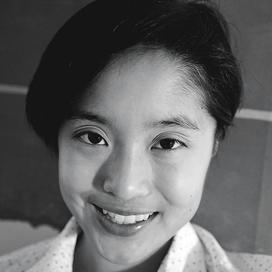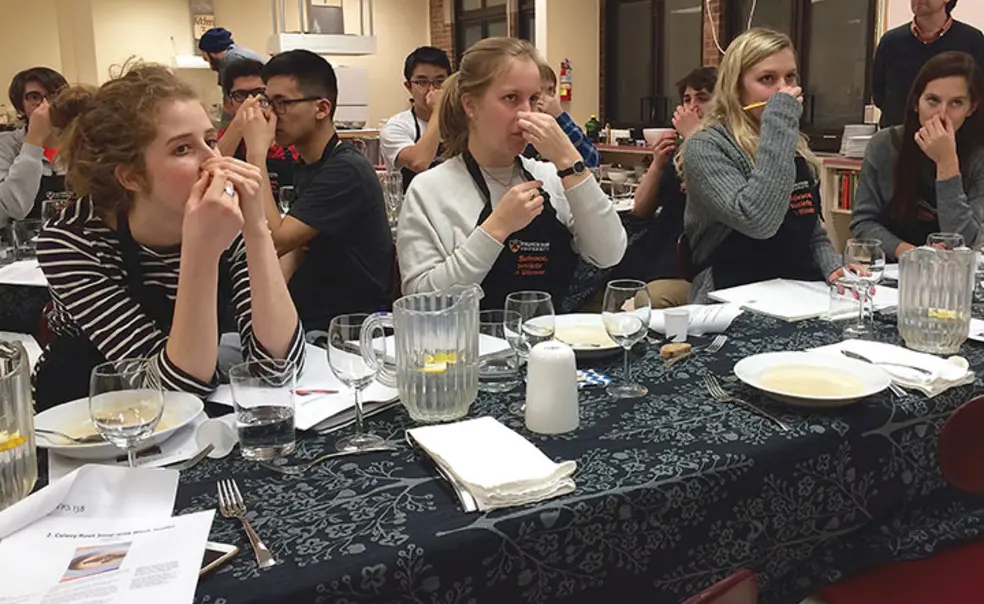Recipe for a Freshman Seminar: A Chef, a Professor, and a Kitchen
Just after 7:30 on a recent Monday evening, 15 freshmen shuffled into a kitchen at John Witherspoon Middle School, a mile from the Princeton campus. They put their coats and bags down in a corner, and quickly donned black aprons. Embroidered in orange letters across the front of each were the words “Science, Society & Dinner.”
This is FRS 138, a freshman seminar that combines lab sessions, cooking lessons from a five-star chef, lectures, field trips, and “outrageously delicious meals that students prepare for each other” to explore the intersections between food systems, food choices, and human health. The class also considers a broader question: How will we sustainably feed nine billion people by the end of this century?

Rozalie Czesana ’18, who helped create the seminar, grew up in Prague, the Czech Republic. Food was a large part of family life: For holiday gatherings, she would arrive at a relative’s home a day in advance to prepare a huge feast, and each day she would walk to the local vegetable store to gather the freshest ingredients for the evening’s dinner. Czesana wanted to recreate this intimate relationship with food in Princeton, half a world away.
After joining Spoon, a student-run online food magazine, she met Karla Cook, who has written restaurant reviews for The New York Times and is the project manager for Princeton Studies Food, a two-year-old program that encourages student and faculty interest in food issues.
Czesana said she and Cook decided that “we need a class that sees food as more than something you fuel on.” Cook reached out to Craig Shelton, a celebrated New Jersey chef, while Czesana contacted engineering professor Kelly Caylor, and the course took shape.
On this Monday evening, Shelton — dressed in a white chef’s coat — explains that the class will explore “how technique affects quality, nutrition, and ultimately, yield.”
The students separate into five teams of three, and each team is given three proteins: a top round of beef, a breast of chicken, and a filet of salmon. Their task is to divide the different proteins into equal samples, cook them in sous vide cookers — essentially, water ovens — set at different temperatures, and then evaluate the end product based on final weight (the yield), as well as on factors like taste, texture, juiciness, and tenderness. The students find that, in general, cooking the beef and chicken at lower temperatures for a longer time results in higher yield and juicier, more tender meat.
During other weeks, the students prepare an entire multi-course meal, working from a menu designed by Shelton. They might cook lobster stew one week, braised beef short ribs with potato puree the next. Many of the menus feature specialty items such as premium grass-fed beef, Mangalitsa pork, and artisanal honey.
At the same time, the class “really stressed the importance of paying attention to what foods the nation produces and what we as consumers purchase and put into our bodies,” said Francesca Billington ’19. To address the big question –– how to feed a rapidly growing population –– students have looked at crop production and land division, as well as methods for producing the most nutrient-dense food and even the proper way to slice vegetables to preserve the most nutrients and vitamins (“quickly,” to prevent the juices from seeping out, Billington explained).
Students also pick up a steady progression of culinary techniques during the course of the semester, starting with basic knife skills and progressing to advanced pan roasting, sous vide cooking, and the aesthetics of presentation. A final cooking session will combine all they have learned in preparing a carefully designed dinner, with each team cooking one course.
There won’t be ruthless grading on cooking skills, à la the MasterChef TV show. But Czesana hopes that at the end of 12 weeks, each student will walk away with a heightened awareness: Where is the food from? How did it get to your plate? Who will you eat it with, and how will you eat it? In sum, an appreciation that “food is way more than just the calories you’re eating.”












No responses yet